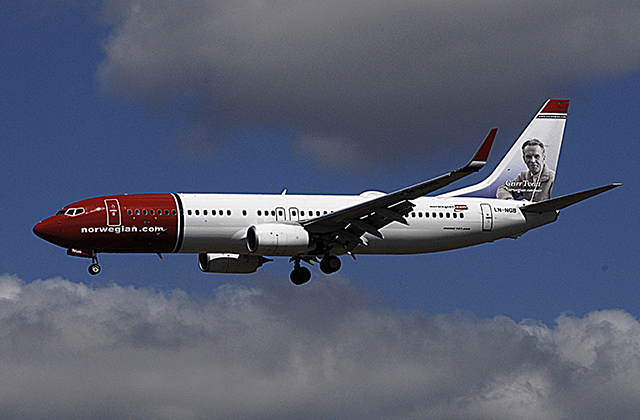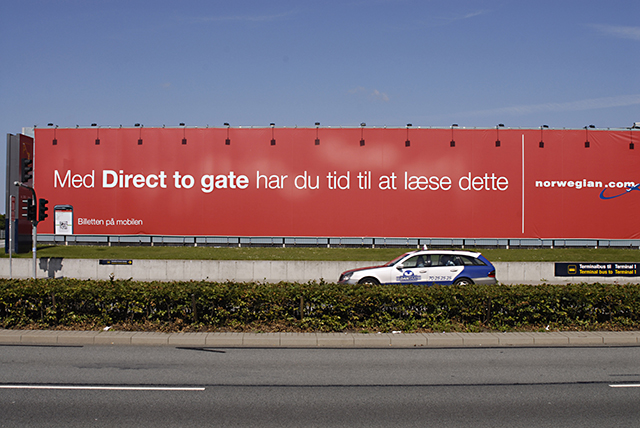An upstart transcontinental airline says it’s making headway with lower costs for passengers and higher pay for workers, but its business model put it on the radar screen of established carriers and a powerful labor union. Now those forces want Washington to forbid the competition to land in the United States.
The surviving big birds of American aviation – United, Delta, and American – have weighed in on the side of the world’s biggest airline pilots union. The union bluntly claims Norwegian Air International doesn’t have the well-being of customers and employees at heart.
To Norwegian employee Bill Hennessey, a flight attendant for 23 years and himself a former official with another union, it’s all about keeping a daunting competitor from taking off.
“Together, these U.S. airlines control almost 90 percent of the transatlantic market,” Hennessey says in an interview with The Foundry. “That’s a monopoly, and that’s why the profit margins on those tickets are so enormous. They make a killing because there is no competition.”
His advice to the traveler who wants to go overseas this summer but is constrained by finances? Check out the fares available at www.norwegian.com.
“We have no demographic; we target anyone,” says Hennessey, who represented his airline’s chapter to the Association of Flight Attendants union from 2001 to 2005 and flies with Norwegian out of his home base of Orlando, Fla. “That is, anyone who wants to travel across the Atlantic, but who can only afford a certain amount. … We have business travelers and vacationers who travel the same route back and forth between the U.S. and Europe.”
Compare flights offered by the established transatlantic carriers out of the United States—namely United Airlines, Delta Air Lines, and American Airlines—against the service Norwegian launched last year.
On American, for instance, a round-trip ticket June 2 and 9 from New York-JFK International Airport to Oslo costs about $1,440. The same flight on Norwegian? Around $862. That’s a $578 difference.
And that’s Hennessey’s take on the need for competition.
Officials of the Air Line Pilots Association, International, which bills itself as the world’s largest union of airline pilots, disagree. In December, the Washington-based pilots union asked the U.S. Department of Transportation to reject an application by Norwegian’s newest affiliate, Norwegian Air International (NAI), to continue service to the United States.
“Norwegian Air International was clearly designed to attempt to dodge laws and regulations, starting a race to the bottom on labor and working conditions,” Capt. Lee Moak, president of the union, said in a press statement. “If successful, the company would gain a serious and unfair economic advantage over U.S. airlines in the competition for the business of international passengers flying to and from the United States.”
Now, the Air Line Pilots Association reportedly is about to unleash an advertising blitz called “Deny NAI” that urges Transportation Secretary Anthony Foxx to turn down Norwegian’s application.
The pilots union repeatedly has accused Norwegian of substandard labor practices that translate into lower wages and inferior work conditions.
Competing airlines have been vocal as well. A joint statement from Delta, United, and American to DOT accusing the Norwegian affiliate of circumventing Norway’s labor laws coincided with the union’s broadside.
‘A new business model’
So what gives? Is Norwegian somehow gaming the system? Or is it breaking up an anti-competitive monopoly that does a disservice to customers and employees?
“Norwegian is offering a new business model that directly impacts the people who are heavily invested in the old business model,” says Robert Mann, president of R.W. Mann and Co., an airline industry analysis and consulting firm based in Port Washington, N.Y.
Norwegian’s international service has been “disruptive to the industry,” Mann notes, but contrary to corporate and union critics, he doesn’t think the airline has engaged in unfair practices.
“If Norwegian is successful, you will see others step in,” Mann says.
Norwegian Air Shuttle, which began operation in 1993, launched international flights between the United States and Scandinavia in May 2013. In November, it added “long-haul routes” to Fort Lauderdale, Fla., from Copenhagen, Oslo, and Stockholm.
Low-cost, long-haul services traditionally have not been particularly successful, Mann says, because airlines have to cover fuel costs and longer distances translate into fewer flights.
A critical turning point came in February when Norwegian obtained an air operator certificate from the Irish Aviation Authority in Dublin. This is important because Irish carriers are part of the “Open Skies” air service agreement allowing any airline based in the United States or European Union to access airports in both regions.
Norwegian would like to take full advantage of these rights, but needs U.S. government approvals to do so.
‘Competition is good for everyone’
This year, the airline plans to expand round-trip services to include new flights from Stockholm to Oakland and Los Angeles; from Copenhagen to Los Angeles and New York; and from Oslo to Oakland, Los Angeles, and Orlando. Norwegian recently announced it will begin service in July from London’s Gatwick Airport to New York, Los Angeles, and Fort Lauderdale.
“No other airline on the globe is doing what we are doing,” Hennessey insists. “That’s because low-cost carriers focus on short- to medium-haul routes. But we are looking at what Southwest, JetBlue, and Spirit are doing here in the U.S. with low fares and applying that concept at a much broader level. We are doing this overseas and across the Atlantic.”
Contrary to what U.S.-based unions and legacy airlines contend, he says, Norwegian is creating opportunities for workers in the industry and improving customer service.
The airline pilots union puts out “inaccurate statements … that are highly irresponsible and I think quite harmful to those the union is supposed to represent,” Hennessey says. “I don’t consider myself substandard, and I certainly don’t think my colleagues are substandard. Competition is good for everyone. ”
Before joining Norwegian Air International, Hennessey was president of American Eagle’s Master Executive Council to the Association of Flight Attendants, part of the AFL-CIO.
“I have been, and always will be, 100 percent pro-union,” Hennessey says. “If you’re going to be a union president, you have to be aboveboard. That’s why I always held such high standards for our public statements. I don’t think that’s what is happening here, which is why I sent a letter to Captain Moak.”
Norwegian is the first European air carrier to become a major employer for U.S. pilots, flight attendants, and baggage handlers. The airline will hire about 300 new American workers before the end of this year, Hennessey anticipates.
“The union is here to protect American jobs, not close off opportunities,” the veteran flight attendant says. “But if ALPA is successful in its efforts to deny Norwegian access to the U.S., this will mean a loss of jobs. The union is supposed to speak on behalf of those of us in the industry, but [leaders] are not listening to anything we have to say.”
‘The world is changing’
In his letter to Moak, Hennessey tells the head of the pilots union that his salary and benefits as a flight attendant are comparable to other airlines—and, in some respects, the benefits are better. He criticizes the pilots union for actions he says could jeopardize job security for union workers:
Captain Moak, the world is changing. We no longer can afford to live in a world where we expect our respective airlines to provide for 15 percent annual increases in salary when the flying public is demanding lower airfares. (Fact—it cost twice as much in 1983 to fly coast-to-coast than it does in 2013 using the exact same type of aircraft) …”
Although Moak didn’t respond directly to Hennessey, the pilots union provided a statement to The Foundry rebutting the letter.
The union and its 50,000 members who are U.S. and Canadian pilots oppose Norwegian’s “evasive scheme,” the statement says, and will continue to urge U.S. transportation officials to reject Norwegian’s application for a foreign air carrier permit.
Norwegian Air International’s business model is “designed to avoid” Norway’s national labor laws by “scouring the globe for the cheapest labor it can find,” the union argues:
NAI pilots and cabin crews are hired via third-party contractors with wages and working conditions that are substantially inferior to those of Norwegian Air Shuttle’s Norway-based pilots. There are also many questions about which labor standards apply to the pilots and cabin crew who are responsible for the safety of those in the air and on the ground.”
Mann, the industry analyst, disputes this. “These aspersions union leaders have directed against Norwegian are not reasonable,” he says, adding:
Norwegian is operating according the rules as they are interpreted through the E.U.-U.S. agreement. Since Norway is not part of the European Union, the only way the airline could offer this service is by basing their international operations in Ireland. Yes, there are higher labor costs and tighter regulations in Norway that the airline avoids in the E.U.”
‘That is horrible policy’
The pilots union contends that at least 20 union leaders from the private and public sectors and more than 100 members of Congress are on record opposing Norwegian.
That may sound formidable, Hennessey says, but it amounts to little more than posturing from entrenched special interests that are unwilling to change with the times.
James Sherk, senior policy analyst in labor economics at The Heritage Foundation, tends to agree.
“In economic terms, unions are labor cartels,” Sherk says in an interview with The Foundry. “They try to raise the pay of their members by controlling the supply of labor—which [in this case] means keeping out Norwegian Air International employees. Unions operate much like OPEC, only with jobs instead of oil.”
Sherk says economists find that monopolies—labor or otherwise—hurt the overall economy.
“The airlines pilot unions are asking the federal government to benefit their members at the expense of the broader public. That is horrible policy.”
For his part, Hennessey argues that the union actions harm, not help, other workers.
“I’ll tell you what this is about: There is a pilot shortage in the country,” he says. “The foreign carriers pay better, the work conditions are better, and the pay is better. That’s why American citizens are leaving [unionized] carriers and going elsewhere.”
The U.S. pilot shortage is to some extent a result of “sub-par working conditions,” Mann says, adding:
Here’s the irony that union leaders seem to miss. When they criticize Norwegian, they are criticizing a service that could spur U.S. airlines to improve working conditions and lure back pilots who have been going over to airlines outside of the U.S. I would think this is something union leaders would like to see addressed.”
This story was produced by The Foundry’s news team. Nothing here should be construed as necessarily reflecting the views of The Heritage Foundation.




























